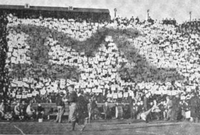1910 Michigan Wolverines football team
On defense, the 1910 Wolverines did not give up a touchdown all season, shut out the final three opponents, and gave up an average of 1.5 points per game.
Left guard and team captain Albert Benbrook was selected as a consensus first-team All-American for the second consecutive year.
Six Michigan players received first-team All-Western honors, including Benbrook, Wells, Magidsohn, tackle William P. Edmunds, end Stanley Borleske, and center Arthur Cornwell.
In August 1910, Dave Allerdice, captain of the 1909 Michigan Wolverines football team, was hired as an assistant coach with responsibility for developing a kicker.
[12] Halfback Joe Magidsohn arrived at Whitemore Lake ten days later but was in "splendid condition after hard summer's work.
"[13] In late September, Yost announced that Shorty McMillan of Detroit would take over the quarterback spot held the prior year by Billy Wasmund.
[14] As the work at Whitmore Lake concluded, the Detroit Free Press wrote that the team was "rounding into form rapidly" and looked "like a machine.
"[15] The Free Press opined that the backfield showed plenty of speed, and the line appeared to be Michigan's strongest in years.
[23] On the eve of the 1910 season opener against Case, Coach Yost expressed satisfaction with his team: "These boys are playing fine football.
In the Detroit Free Press, E. A. Batchelor wrote:"For the first time in many years what had come to be regarded as a fixed festival here will be omitted in 1910, for Case, instead of submitting meekly to the annual licking, played Michigan to a standstill .
This is all very lovely for the Clevelanders who consider the feat of tying the Yost team the event of their lives, but it's tough on Michigan which has become accustomed to whaling Case as an official and auspicious opening for the local football season.
With less than five minutes left in the game, Shorty McMillan completed a pass to Stanley Borleske who ran 50 yards to the Aggies' 15-yard line.
The referee, Ralph Hoagland, commented on Michigan's use of the news rules: "Yost has certainly taught his men some great things about the forward pass.
Michigan protested Notre Dame's use of two players (George Philbrook and Ralph Dimmick) who had reportedly played more than four years of college football.
Yost's men, quoted at the long price of 10 to 6 in the betting prior to the opening of hostilities, showed a spirit and strength that completely astounded the easterners.
"[49] Eckersall wrote that Michigan's versatile offense bewildered Penn, and he described Yost's 1910 squad as "a team which has reached the pinnacle of football perfection.
Cole was unable to grab the football and "instead kicked it over the goal line where one of Mr. Penn's sons fell on it for a touchback that was a lifesaver to the Red and Blue hosts.
Batchelor blamed Michigan's inability to score on a rule change preventing the ball carrier from being pushed or pulled across the goal line by his own teammates.
He complained about the new game which "the reformers invented and handed to that element of the public which believes the gridiron pastime should be a sport for invalids in evening dress.
He tore through the heavy Penn forwards for substantial gains, while his squirming, turning end runs added many yards to Michigan's total.
He was equally effective on the defense, and his ability to solve Penn's offense and direct his team mates to the point of attack had a good deal to do with the checking of the local's best ground gaining plays.
[49]Batchelor praised the work of Michigan captain Albert Benbrook who loomed "like a mountain above the ruck of players" and on defense "smashed up plays with a vigor that sometimes threatened the very lives of the enemy.
[48][49][50] After three consecutive road games, Michigan concluded its 1910 season at Ferry Field with a 6–0 victory over Minnesota in front of a crowd of more than 20,000 persons.
The investigation concluded that Thomson's entrance credits were "equivalent to the requirements of the literary department, though not corresponding to the precise subjects enumerated in the university calendar.
Down on the field the Michigan team, substitutes, coaches, band and everyone else who managed to pass the barriers and gain admittance to the inclosure [sic] set aside for the elect, swarmed out on the battle ground, mingling in one wild, joyous, shouting, hugging, handshaking mob.
[60][61] E. A. Batchelor summed up the victory over Minnesota:Two perfectly executed forward passes, each swift and sure as a rapier's thrust; two plunges into the Minnesota line, and Michigan this afternoon has beaten the Gophers, won the undisputed championship of the west, established her claim to be considered the country's best and proved the superiority of skill and cunning over mere strength.
"[60] Batchelor noted that the final minutes of the game were like the events that "occur mostly in books featured by the exploits of Frank Merriwell" and other fictional heroes.
[66] Left halfback Joe Magidsohn was the team's leading scorer with 10 points on two touchdown runs of 30 and 40 yards against Syracuse and also received first-team All-American honors from some selectors.
In the Chicago Daily Tribune, Walter Eckersall selected Michigan players for five of the eleven first-team positions on his All-Western team.
Facing a threatened break in athletic relations with Amos Alonzo Stagg's Chicago Maroons and a rebuke from the conference, Minnesota was forced to cease scheduling games against Michigan.







